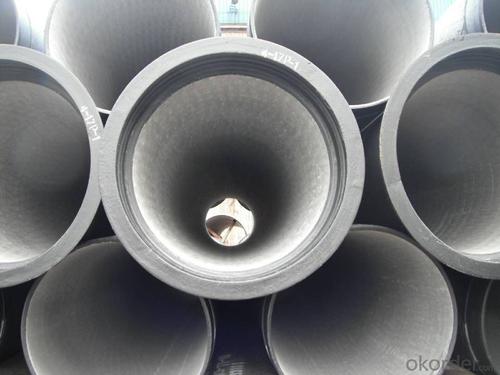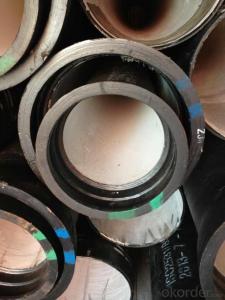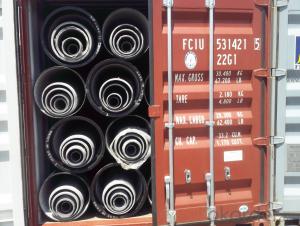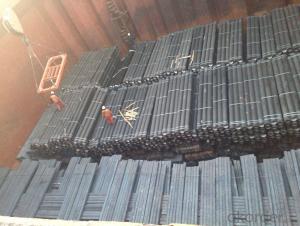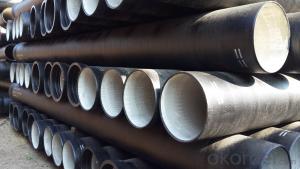DUCTILE IRON PIPE DN350
- Loading Port:
- China Main Port
- Payment Terms:
- TT OR LC
- Min Order Qty:
- -
- Supply Capability:
- -
OKorder Service Pledge
OKorder Financial Service
You Might Also Like
Specification:
1) The standard of pipe: ISO2531:1998, K9
2) Effective length: 6m
3) Inner cement line: Portland cement line as per ISO4179
4) Zinc coating: at least 130g/m2 as per ISO8179
5) Bitumen painting: at least 70um as per ISO8179
6) With 100% quantity of NBR ring, or SBR ring, or EPDM ring as per ISO4633
7) DN80mm-800mm
8) High strength, lighter than grey iron, good corrosion resistance, no furring, small flow resistance, easy fixing, long life tome about 100 yeas
9) Produced by Hangzhou chunfeng machine
10) Checked by automatic inspection equipment
11) Composition:
Chemical composition | |||
Chemical composition | Ductile Cast Iron Pipe (%) | Grey iron pipe (%) | Steel pipe (%) |
C | 3.5-4.0 | 3.2-3.8 | 0.1-0.2 |
Si | 1.9-2.6 | 1.4-2.2 | 0.15-0.4 |
Mn | 0.15-0.45 | 0.4-0.6 | 0.3-0.6 |
P | ≤0.06 | ≤0.3 | 0.02-0.03 |
S | ≤0.02 | ≤0.1 | 0.02-0.03 |
Mg | 0.03-0.06 |
|
|
12) Feature:
Mechanical properties | |||
| Ductile Cast Iron Pipe | Grey Iron Pipe | Steel Pipe |
Tensile Strength(Mpa) | ≥420 | 150-260 | ≥400 |
Yield Strength(Mpa) | ≥300 | No Confirmation | No Confirmation |
Bending Strength(Mpa) | ≥590 | 200-360 | ≥400 |
Elongation (%) | ≥10 | Neglected | ≥18 |
Brinell Hardness(HBS) | ≤230 | ≤230 | About 140 |
13) T type mechanical joint
14) Packing: in bulk or container
- Q: What are the differences between ductile cast iron pipes and centrifugal ductile iron pipes?
- Small, thin pipe fittings are usually rolled or continuously cast, and large, thick pipes are usually centrifugally cast. Compared to sand casting, the tissue is compact and homogeneous.
- Q: What is the expected noise reduction of ductile iron pipes?
- The expected noise reduction of ductile iron pipes can vary depending on various factors, such as the thickness of the pipes, the specific installation method, and the surrounding environment. However, ductile iron pipes are generally known for their ability to significantly reduce noise levels compared to other materials, thanks to their dense and robust structure that effectively dampens sound vibrations.
- Q: What are the common pressure ratings for ductile iron pipes?
- Common pressure ratings for ductile iron pipes vary depending on the specific application and industry standards. However, the most commonly used pressure ratings for ductile iron pipes are Class 150, Class 200, Class 250, and Class 350. Class 150 ductile iron pipes are typically used for low-pressure applications, with a working pressure of up to 150 psi (pounds per square inch). These pipes are commonly used for water distribution systems, irrigation, and gravity flow sewer systems. Class 200 ductile iron pipes have a higher working pressure of up to 200 psi. These pipes are often used for applications that require a slightly higher pressure, such as industrial water supply, fire protection systems, and wastewater treatment plants. Class 250 ductile iron pipes have a working pressure of up to 250 psi. These pipes are suitable for more demanding applications, such as high-pressure water supply systems, power plants, and municipal water distribution networks. Class 350 ductile iron pipes have the highest working pressure rating, with a maximum pressure of up to 350 psi. These pipes are typically used for heavy-duty applications, such as industrial water supply, oil and gas pipelines, and large-scale water transportation projects. It's important to note that these pressure ratings are general guidelines and may vary depending on the specific manufacturer and product specifications. Consulting industry standards and guidelines, as well as working with qualified engineers and professionals, is essential to ensure the correct pressure rating is selected for a particular ductile iron pipe application.
- Q: How to correctly measure ductile iron pipe
- Ductile pipe diameter is around the tube around the peripheral measurement, use tools to gauge the inner diameter of the pipe, the length of the pipe is used to measure the ruler or tape, ductile iron pipe wall thickness can be measured directly, may also be a suitable tool for indirect measurement, the general profession will experience with project measure tube the size.
- Q: Can ductile iron pipes be used for potable water systems?
- Indeed, potable water systems can utilize ductile iron pipes. Ductile iron, which undergoes treatment with magnesium to enhance its strength and flexibility, characterizes this type of iron. These pipes are esteemed for their robustness, resistance to corrosion, and ability to endure high pressure. They are frequently employed in water distribution systems, inclusive of potable water supply. Nevertheless, guaranteeing that the ductile iron pipes employed in potable water systems adhere to the requisite standards and regulations set by local authorities, such as NSF/ANSI 61 for drinking water system components, is of utmost importance. Consistent maintenance and regular testing are also indispensable to ensure the ongoing safety and excellence of the potable water system.
- Q: Do ductile iron pipes require concrete encasement for support?
- Concrete encasement is typically necessary for providing support to ductile iron pipes. This encasement offers extra stability and strength, safeguarding the pipes against pressure-induced shifting or collapsing. Furthermore, it aids in evenly distributing the load along the pipe's length and shielding it from external forces like soil movement or heavy vehicular activity. In addition to these benefits, concrete encasement helps reduce the likelihood of corrosion or damage caused by external impacts, thereby ensuring the long-lasting durability of the ductile iron pipes.
- Q: Are ductile iron pipes suitable for use in agricultural applications?
- Yes, ductile iron pipes are suitable for use in agricultural applications. They are known for their durability, strength, and resistance to corrosion, making them ideal for transporting water, sewage, and irrigation systems commonly found in agriculture. Additionally, ductile iron pipes have a long lifespan and can withstand high pressure, making them a reliable choice for agricultural applications.
- Q: How are ductile iron pipes protected against external damage?
- Ductile iron pipes are protected against external damage through a combination of various protective measures. One common method used is the application of a protective coating on the external surface of the pipe. This coating acts as a barrier, preventing the direct contact of the pipe with corrosive elements in the surrounding environment. The coating can be made of materials such as epoxy, polyurethane, or zinc, which provide excellent resistance against corrosion, abrasion, and chemical attacks. Additionally, ductile iron pipes can be further protected by encasing them in a concrete or cement mortar lining. This lining provides an extra layer of protection, reducing the chances of physical damage due to external impacts or soil movement. The concrete or cement mortar lining also helps to improve the pipe's hydraulic performance by reducing friction and maintaining a smooth flow of water or other fluids. Furthermore, ductile iron pipes are often installed with proper bedding and backfilling techniques. This involves using suitable materials such as sand or gravel to support and stabilize the pipe, minimizing the risk of external damage caused by uneven ground settlement or heavy loads. Adequate compaction of the backfill material is crucial to ensure the long-term integrity and stability of the pipe. Regular inspection and maintenance are also essential for protecting ductile iron pipes against external damage. Periodic inspections can identify any signs of corrosion, coating degradation, or physical damage, allowing for timely repairs or replacement before significant issues arise. Additionally, proper cathodic protection systems can be employed to prevent corrosion by applying an electric current that counteracts the electrochemical reactions occurring on the pipe's surface. In summary, ductile iron pipes are protected against external damage through the application of protective coatings, concrete or cement mortar linings, proper bedding and backfilling techniques, and regular inspections and maintenance. These measures collectively ensure the durability, longevity, and reliable performance of ductile iron pipes in various environments and applications.
- Q: Usage of ductile iron pipe expander
- Usage of ductile iron pipe expander:1, the expansion device should check its type, specification and piping configuration before installation, must comply with the design requirements.2, the expansion of the inner sleeve should be noted that the direction of the inner sleeve is consistent with the direction of the medium flow. The hinge rotation plane of the hinge type telescopic device should be consistent with the displacement rotation plane.3, the need for "cold tight" expansion device, pre deformation of the auxiliary components should be installed in the pipeline before they can be removed.4, it is strictly prohibited to use telescopic deformation method to adjust the installation of the pipe, so as not to affect the normal function of the telescopic device, reduce the service life and increase the piping, equipment and supporting components of the load.5 、 during installation, welding slag is not allowed to splash to the surface of wave shell, and the wave shell is not allowed to suffer other mechanical damage.6, pipe installation is completed, should be removed as soon as the wave expansion device used for installation and transportation of yellow auxiliary positioning components and fasteners, and according to the design requirements will be transferred to the specified position limiting device, the pipe system has the ability to compensate fully in the environmental conditions.
- Q: Can ductile iron pipes be repaired if they get damaged?
- Yes, ductile iron pipes can be repaired if they get damaged. The repair process typically involves cutting out the damaged section and replacing it with a new pipe segment or using repair clamps to fix minor leaks or cracks.
Send your message to us
DUCTILE IRON PIPE DN350
- Loading Port:
- China Main Port
- Payment Terms:
- TT OR LC
- Min Order Qty:
- -
- Supply Capability:
- -
OKorder Service Pledge
OKorder Financial Service
Similar products
Hot products
Hot Searches
Related keywords




